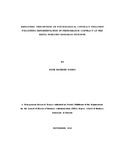| dc.description.abstract | The degree to which employees perceive that their organization has fulfilled their psychological contract determines the level of three components; commitment, loyalty and satisfaction. These three components are very important for organizations that need to strap up their human tesources for improved productivity. Psychological contract involves perceptions of the terms and conditions of the agreement between employees and the employer. Today in the Kenya public service, this relationship is largely defined by performance contract. This study sought to establish employees' perceptions of psychological contract violation at the Kenya Forestry Research Institute following implementation of performance contracting.
A case study design was used to enable the researcher gather relevant data for this academic undertaking. The target respondents included all employees in the 6 regional centres of KEFRI. Cluster sampling was applied to draw the sample size of 51 respondents. Primary data was collected using structured questionnaires. Of the 51 respondents, 36 responded to the questionnaire, bringing in a response rate of 70%. Data analysis was done by use of descriptive statistics and results presented in charts
and graphs.
It was found that KEFRI employees' role in performance contracts was largely implementation (58%) while a considerable percentage said their role was implementation, monitoring and control (31 %). Steady employment, secure employment, and support to attain the highest possible level were rated highest under commitments and obligations of the employer. This denoted a relational type of contract. Similarly the relationship with the employer was found to be stable as most of the negative aspects were rated low by the respondents.
On commitments and obligations by employees following implementation of performance contracts, the respondents were ready to perform required tasks, accept increasingly challenging performance standards, accept new and different performance demands, respond positively to dynamic performance requirements, and commit personally to their organization. This further indicated the existence of a balanced dynamic psychological contract. It is recommended that KEFRI management endear to capitalize on the balanced dynamic psychological contract and tum it into a
competitive advantage for increased productivity. | en_US |

